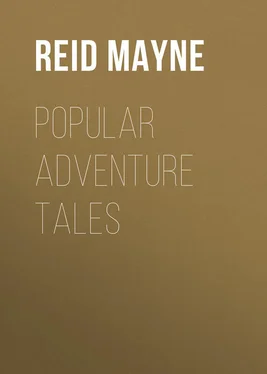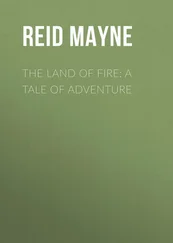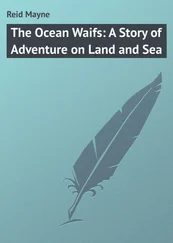Mayne Reid - Popular Adventure Tales
Здесь есть возможность читать онлайн «Mayne Reid - Popular Adventure Tales» — ознакомительный отрывок электронной книги совершенно бесплатно, а после прочтения отрывка купить полную версию. В некоторых случаях можно слушать аудио, скачать через торрент в формате fb2 и присутствует краткое содержание. Жанр: literature_19, foreign_antique, foreign_prose, foreign_children, на английском языке. Описание произведения, (предисловие) а так же отзывы посетителей доступны на портале библиотеки ЛибКат.
- Название:Popular Adventure Tales
- Автор:
- Жанр:
- Год:неизвестен
- ISBN:нет данных
- Рейтинг книги:3 / 5. Голосов: 1
-
Избранное:Добавить в избранное
- Отзывы:
-
Ваша оценка:
- 60
- 1
- 2
- 3
- 4
- 5
Popular Adventure Tales: краткое содержание, описание и аннотация
Предлагаем к чтению аннотацию, описание, краткое содержание или предисловие (зависит от того, что написал сам автор книги «Popular Adventure Tales»). Если вы не нашли необходимую информацию о книге — напишите в комментариях, мы постараемся отыскать её.
Popular Adventure Tales — читать онлайн ознакомительный отрывок
Ниже представлен текст книги, разбитый по страницам. Система сохранения места последней прочитанной страницы, позволяет с удобством читать онлайн бесплатно книгу «Popular Adventure Tales», без необходимости каждый раз заново искать на чём Вы остановились. Поставьте закладку, и сможете в любой момент перейти на страницу, на которой закончили чтение.
Интервал:
Закладка:
Hugot, the ex-chasseur and attached domestic, who was accustomed to follow his master like a shadow, had also followed him into the next world. It was not grief that killed Hugot, though he bore the loss of his kind master sadly enough. But it was not grief that killed Hugot. He was laid low by the same disease of which his master had died – the yellow fever. A week had scarcely passed after the death of the latter, before Hugot caught the disease, and in a few days he was carried to the tomb and laid by the side of his “old Colonel.”
The Boy Hunters – Basil, Lucien, François – became orphans. They knew of but one relation in the whole world, with whom their father had kept up any correspondence. This relation was an uncle, and, strange as it may seem, a Scotchman – a Highlander, who had strayed to Corsica in early life, and had there married the Colonel's sister. That uncle had afterwards emigrated to Canada, and had become extensively engaged in the fur trade. He was now a superintendent or “factor” of the Hudson's Bay Company, stationed at one of their most remote posts near the shores of the Arctic Sea! There is a romance in the history of some men wilder than any fiction that could be imagined.
I have not yet answered the question as to where our Boy Hunters were journeying in their birch-bark canoe. By this time you will have divined the answer. Certainly, you will say, they were on their way to join their uncle in his remote home. For no other object could they be travelling through the wild regions of the Red River. That supposition is correct. To visit this Scotch uncle (they had not seen him for years) was the object of their long, toilsome, and perilous journey. After their father's death he had sent for them. He had heard of their exploits upon the prairies; and, being himself of an adventurous disposition, he was filled with admiration for his young kinsmen, and desired very much to have them come and live with him.
Being now their guardian, he might command as much, but it needed not any exercise of authority on his part to induce all three of them to obey his summons. They had travelled through the mighty forests of the Mississippi, and upon the summer prairies of the South. These great features of the earth's surface were to them familiar things, and they were no longer curious about them. But there remained a vast country which they longed eagerly to explore. They longed to look upon its shining lakes and crystal rivers; upon its snow-clad hills and ice-bound streams; upon its huge mammalia – its moose and its musk-oxen, its wapiti and its monster bears. This was the very country to which they were now invited by their kinsman, and cheerfully did they accept his invitation.
Already had they made one-half the journey, though by far the easier half. They had travelled up the Mississippi by steamboat as far as the mouth of the St. Peter's. There they had commenced their canoe voyage – in other words became “voyageurs” – for such is the name given to those who travel by canoes through these wild territories. Their favourite horses and the mule “Jeannette” had been left behind. This was a necessity, as these creatures, however useful upon the dry prairies of the South, where there are few or no lakes, and where rivers only occur at long intervals, would be of little service to the traveller in the Northern regions. Here the route is crossed and intercepted by numerous rivers; and lakes of all sizes, with tracts of inundated marsh, succeed one another continually. Such, in fact, are the highways of the country, and the canoe the travelling carriage; so that a journey from one point of the Hudson's Bay territory to another is often a canoe voyage of thousands of miles – equal to a “trip” across the Atlantic.
Following the usual custom, therefore, our Boy Hunters had become voyageurs – “ Young Voyageurs .” They had navigated the St. Peter's in safety, almost to its head-waters. These interlock with the sources of the Red River. By a “portage” of a few miles they had crossed to the latter stream; and, having launched their canoe upon its waters, were now floating downward and northward with its current. But they had yet a long journey before them – nearly two thousand miles! Many a river to be “run,” many a rapid to be “shot,” many a lake to be crossed, and many a “portage” to be passed, ere they could reach the end of that great voyage .
Come, boy reader, shall we accompany them? Yes. The strange scenes and wild adventures through which we must pass, may lighten the toils, and perhaps repay us for the perils of the journey. Think not of the toils. Roses grow only upon thorns. From toil we learn to enjoy leisure. Regard not the perils. “From the nettle danger we pluck the flower safety.” Security often springs from peril. From such hard experiences great men have arisen. Come, then, my young friend! mind neither toil nor peril, but with me to the great wilderness of the North!
Stay! We are to have another “ compagnon du voyage .” There is a fourth in the boat, a fourth “young voyageur.” Who is he? In appearance he is as old as Basil, full as tall, and not unlike him in “build.” But he is altogether of a different colour . He is fair-haired; but his hair (unlike that of Lucien, which is also light-coloured) is strong, crisp, and curly. It does not droop, but stands out over his cheeks in a profusion of handsome ringlets. His complexion is of that kind known as “fresh,” and the weather, to which it has evidently been much exposed, has bronzed and rather enriched the colour. The eyes are dark blue, and, strange to say, with black brows and lashes! This is not common, though sometimes observed; and, in the case of the youth we are describing, arose from a difference of complexion on the part of his parents. He looked through the eyes of his mother, while in other respects he was more like his father, who was fair-haired and of a “fresh” colour.
The youth, himself, might be termed handsome. Perhaps he did not possess the youthful beauty of François, nor the bolder kind that characterized the face of Basil. Perhaps he was of a coarser “make” than any of his three companions. His intellect had been less cultivated by education, and education adds to the beauty of the face . His life had been a harder one – he had toiled more with his hands, and had seen less of civilized society. Still many would have pronounced him a handsome youth. His features were regular, and of clean outline. His lips expressed good-nature as well as firmness. His eye beamed with native intelligence, and his whole face bespoke a heart of true and determined honesty — that made it beautiful .
Perhaps a close scrutinizer of countenances might have detected some resemblance – a family one – between him and his three companions. If such there was, it was very slight; but there might have been, from the relationship that existed between them and him. He was their cousin – their full cousin – the only son of that uncle they were now on their way to visit, and the messenger who had been sent to bring them. Such was the fourth of “the young voyageurs.”
His dress was not unlike that worn by Basil; but as he was seated on the bow, and acting as pilot, and therefore more likely to feel the cold, he wore over his hunting-shirt, a Canadian capote of white woollen cloth, with its hood hanging down upon his shoulders.
But there was still another “voyageur,” an old acquaintance, whom you, boy reader, will no doubt remember. This was an animal, a quadruped, who lay along the bottom of the canoe upon a buffalo's hide. “From his size and colour – which was a tawny red – you might have mistaken him for a panther – a cougar. His long black muzzle and broad hanging ears gave him quite a different aspect, however, and declared him to be a hound. He was one – a bloodhound, with the cross of a mastiff – a powerful animal. It was the dog 'Marengo.'” You remember Marengo?
Читать дальшеИнтервал:
Закладка:
Похожие книги на «Popular Adventure Tales»
Представляем Вашему вниманию похожие книги на «Popular Adventure Tales» списком для выбора. Мы отобрали схожую по названию и смыслу литературу в надежде предоставить читателям больше вариантов отыскать новые, интересные, ещё непрочитанные произведения.
Обсуждение, отзывы о книге «Popular Adventure Tales» и просто собственные мнения читателей. Оставьте ваши комментарии, напишите, что Вы думаете о произведении, его смысле или главных героях. Укажите что конкретно понравилось, а что нет, и почему Вы так считаете.












